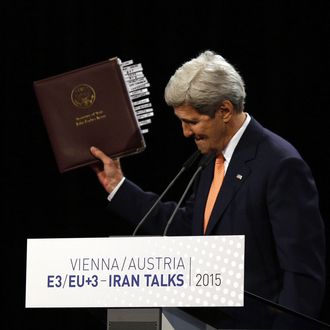
Sunday marked the official “adoption day” for the “Joint Comprehensive Plan of Action” better known as the Iran deal.
Now that the agreement is officially in place — after years of negotiations between Iran, the United States, Britain, France, Germany, Russia, China, and endless worries that it wouldn’t survive Congress — the world’s leaders and diplomats are waiting to see if it will work.
“Adoption day” is not the same as “implementation day” — the U.S. won’t start easing nuclear-power-related sanctions against Iran until the country has proved it is obeying the deal by doing things like decommissioning 15,000 centrifuges, redesigning the Arak reactor, and reducing its enriched uranium stockpile. The United States expects Iran to complete these objectives in two to six months. However, President Barack Obama and leaders in the European Union set in motion all the paperwork to make the sanction lifting possible a few months down the road. Officials have been wary to fix a date to when implementation day might occur. As the New York Times points out, an official told reporters in September, “They clearly have motivation to try to accomplish those steps as soon as possible. But look, this is a very complicated deal.”
The United Nations’ International Atomic Energy Agency will be conducting the inspections to determine whether Iran has kept up its part of the deal. The final report on the country’s progress will be released on December 15.
After the IAEA gives Iran a thumbs-up — or tells its government it has more work to do — the next milestone will take place in 2023: “Transition Day.” At that point, all of Iran’s remaining nuclear resources are supposed to be used for peaceful means. Ten years from now, if all goes according to plan, additional sanctions are supposed to be lifted.
“I am confident in the extraordinary benefits to our national security and the peace and security of the world that come with the successful implementation of the [Iran deal],” Obama said in a statement on Sunday.
However, there are plenty of ways that the process could continue to get complicated, even now that adoption day has come and gone. Some observers wonder how open Iranian officials will be with the U.N. inspectors. Other U.S. officials are frustrated by an Iranian court’s decision to convict a Washington Post reporter of espionage. Last week, Iran tested a ballistic missile. One official told Reuters, “This is not, unfortunately, something new. There is a long pattern of Iran ignoring UN security council resolutions on ballistic missiles.”
Secretary of State John Kerry noted in a statement yesterday that he is very aware that his job has only just begun when it comes to dealing with Iran and nukes. “I and my entire team will remain vigilant and mindful of not just how far we have come, but how much further we have to go in seeing that this deal is fully implemented,” he said.





























